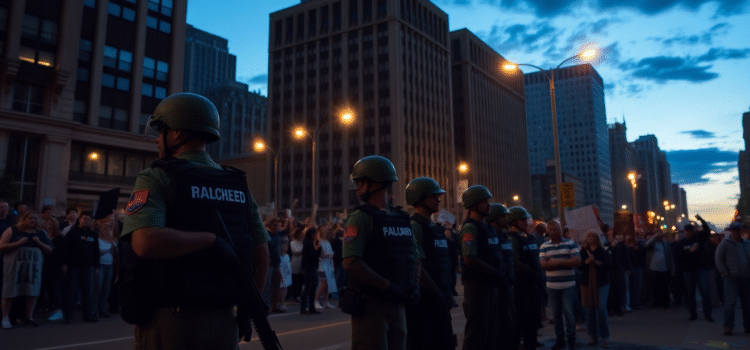
Texas National Guard Deployment Amid Protests; Georgia Unveils Domestic Terror Charges Strategy
In a significant development, Texas has deployed over 1,000 National Guard troops to major cities like Austin, Dallas, and Houston, responding to widespread protests. Meanwhile, Georgia has announced a robust strategy to address protest-related violence through domestic terror charges. These decisive state actions reflect a broader trend across the United States, as authorities aim to manage and mitigate civil unrest effectively.
Understanding the Texas National Guard Deployment
Amid escalating protests in Texas, authorities have decided to deploy the National Guard as a proactive measure to ensure public safety and order. With over 1,000 troops stationed across key urban centers, the deployment aims to prevent the protests from spiraling into violence. This measure is part of a broader protest security strategy Texas has engaged to preserve peace while respecting individuals’ right to protest.
Texas Guard Deployment Protest Strategy
The Texas Governor has emphasized the significance of a measured response that balances enforcement with citizens’ constitutional rights. More than 150 arrests have already been made in relation to these protests. This demonstrates the state’s commitment to maintaining law and order while providing a platform for lawful expression.
Georgia’s Approach: Domestic Terror Charges
Parallel to Texas, Georgia has introduced a new strategy, aiming to curb protest-related violence through domestic terror charges. This legal framework intends to reclassify specific criminal activities associated with protests, potentially resulting in harsher sentencing and increased legal repercussions. This strategy emerges in response to escalating violence during recent protests, which have resulted in over 200 arrests statewide within the last month.
Georgia Anti-Terrorism Strategy and Legal Measures
Georgia’s approach underscores the need for a robust domestic terrorism charges strategy. By reclassifying certain acts of violence that accompany protests under domestic terrorism, the state aims to deter such activities with the threat of severe legal consequences. This strategy is devised in close coordination with federal agencies, ensuring a comprehensive response to domestic unrest.
Cooperative Response to Protest Challenges
Both Texas and Georgia are collaborating with federal agencies to implement their respective strategies. This coordinated effort highlights a concerted approach to handling civil disturbances while safeguarding public interests. By integrating military and civilian efforts, these states aim to balance enforcement with protective oversight.
- Texas National Guard deployment enhances security during civil protests.
- Georgia’s domestic terror charges strategy seeks to deter violent protest activities.
- State strategies are part of a coordinated effort with federal agencies to manage protests.
Sources
The details in this article are sourced from reputable news reports and official state communications:
FAQ
What prompted Texas to deploy the National Guard?
The escalating protests in major Texas cities led to the deployment to maintain public order and ensure safety.
How does Georgia plan to use domestic terror charges in response to protests?
Georgia’s strategy involves reclassifying certain violent activities linked to protests under domestic terror charges, aiming for harsher penalties.
Are these strategies in collaboration with federal agencies?
Yes, both states are working closely with federal agencies to coordinate a comprehensive response to protest activities.
What is the role of the National Guard in these protests?
The National Guard is deployed to provide support to local law enforcement, ensuring the safety and security of the public and property.







